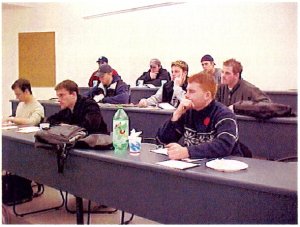
Training materials were designed and field tested by the researchers specifically for this project. These materials included a Male Mentor Handbook, Male Mentor Response Log, and Student Response Log. The materials were useful in that they provided a framework for each Read Aloud and Response session. The model outlined in the materials provided mentors with the opportunity to choose the read aloud books and activities for each session. This gave them the autonomy to plan their own session and fulfill the requirements of being a volunteer in the project.
The mentors were exposed to many different types of books. The extensive book collection provided quality children's literature from which they could select. The researchers relied on the mentors and students to assist them with developing a boy-friendly book collection.

Mentors supported each other by working in
teams at the school. This reduced the risk factor for
individual mentors. They shared the responsibility
for the session. The mentors were also supported
by the researchers both at the school and the
university.
The social relationships established during the
program were important. The mentors were
assigned to the same class each week. This led to
the formation of positive relationships between
students and mentors.